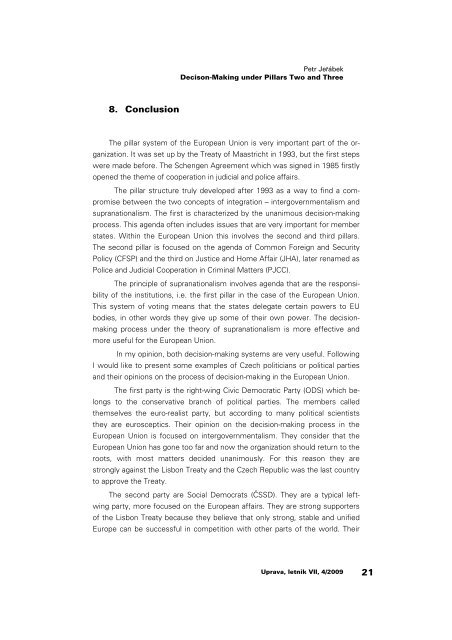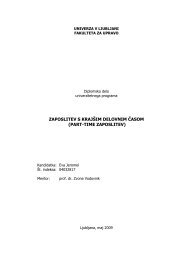Letnik VII, Å tevilka 4, 2009 - Fakulteta za upravo - Univerza v Ljubljani
Letnik VII, Å tevilka 4, 2009 - Fakulteta za upravo - Univerza v Ljubljani
Letnik VII, Å tevilka 4, 2009 - Fakulteta za upravo - Univerza v Ljubljani
- No tags were found...
You also want an ePaper? Increase the reach of your titles
YUMPU automatically turns print PDFs into web optimized ePapers that Google loves.
Petr JeřábekDecison-Making under Pillars Two and Three8. ConclusionThe pillar system of the European Union is very important part of the organi<strong>za</strong>tion.It was set up by the Treaty of Maastricht in 1993, but the first stepswere made before. The Schengen Agreement which was signed in 1985 firstlyopened the theme of cooperation in judicial and police affairs.The pillar structure truly developed after 1993 as a way to find a compromisebetween the two concepts of integration – intergovernmentalism andsupranationalism. The first is characterized by the unanimous decision-makingprocess. This agenda often includes issues that are very important for memberstates. Within the European Union this involves the second and third pillars.The second pillar is focused on the agenda of Common Foreign and SecurityPolicy (CFSP) and the third on Justice and Home Affair (JHA), later renamed asPolice and Judicial Cooperation in Criminal Matters (PJCC).The principle of supranationalism involves agenda that are the responsibilityof the institutions, i.e. the first pillar in the case of the European Union.This system of voting means that the states delegate certain powers to EUbodies, in other words they give up some of their own power. The decisionmakingprocess under the theory of supranationalism is more effective andmore useful for the European Union.In my opinion, both decision-making systems are very useful. FollowingI would like to present some examples of Czech politicians or political partiesand their opinions on the process of decision-making in the European Union.The first party is the right-wing Civic Democratic Party (ODS) which belongsto the conservative branch of political parties. The members calledthemselves the euro-realist party, but according to many political scientiststhey are eurosceptics. Their opinion on the decision-making process in theEuropean Union is focused on intergovernmentalism. They consider that theEuropean Union has gone too far and now the organi<strong>za</strong>tion should return to theroots, with most matters decided unanimously. For this reason they arestrongly against the Lisbon Treaty and the Czech Republic was the last countryto approve the Treaty.The second party are Social Democrats (^SSD). They are a typical leftwingparty, more focused on the European affairs. They are strong supportersof the Lisbon Treaty because they believe that only strong, stable and unifiedEurope can be successful in competition with other parts of the world. TheirUprava, letnik <strong>VII</strong>, 4/<strong>2009</strong> 21
















